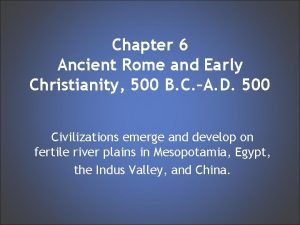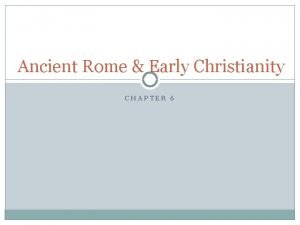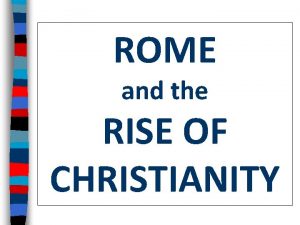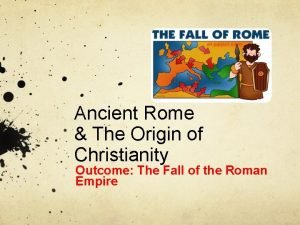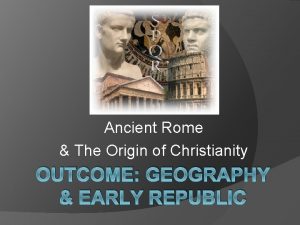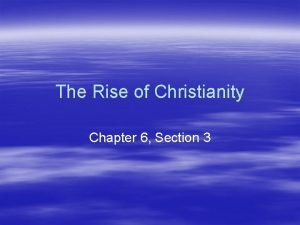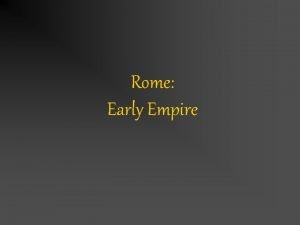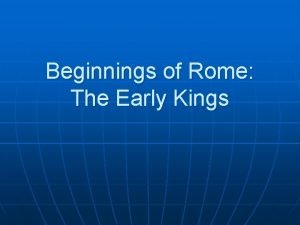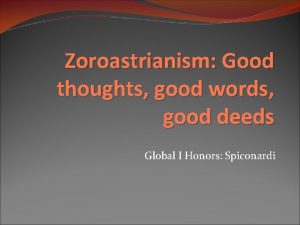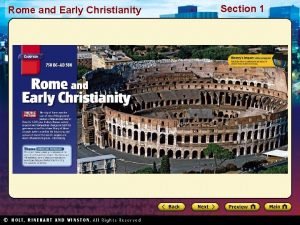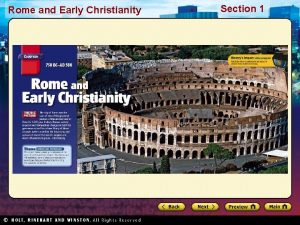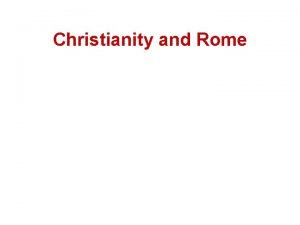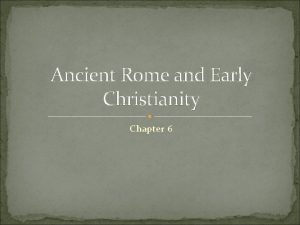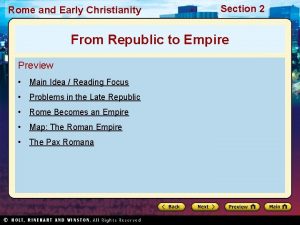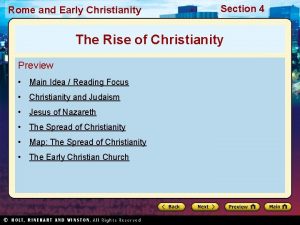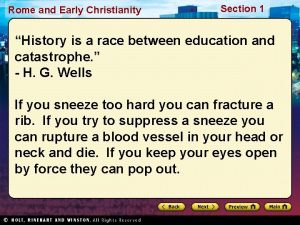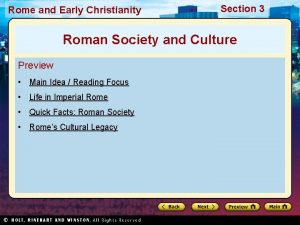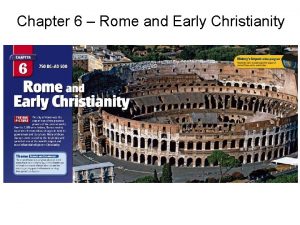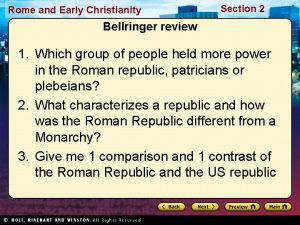Rome and Early Christianity Section 1 Good afternoon























- Slides: 23

Rome and Early Christianity Section 1 Good afternoon! 1. Sit down quietly. Like, seriously. 2. Nothing should be on your desk except for something to write with.

Rome and Early Christianity Section 1 Warm-up your MINDS!!! 1. The combination of religious and political authority in ancient Egypt is known as… 2. List the 5 pillars of Faith 3. Describe the art and architecture of Greece’s Golden Age

Rome and Early Christianity Section 1 Chapter 6 section 1 While Greece was in decline, Rome was prospering in Italy

Rome and Early Christianity Section 1 Does this Empire look familiar? How does it compare to the one Alexander the Great created? How could Rome’s geographic location help it to prosper?

Rome and Early Christianity Section 1 The Foundations of Rome Main Idea From a small town on the banks of an Italian river, Rome grew to control the entire Mediterranean region. Reading Focus • Where and how did Roman civilization develop? • What led to Rome’s becoming a republic? • What were the major events in Rome’s expansion?

Rome and Early Christianity Section 1 ONLY WRITE WHAT IS UNDERLINED

Rome and Early Christianity Section 1 Roman Civilization Develops “All roads lead to Rome. ” “Rome was not built in a day. ” “When in Rome. . . ” How did Rome win such a place in modern popular culture? Italy’s Geography • Peninsula logical place for rise of a mighty empire – Extends south from Europe far into Mediterranean Sea – Lies right in the middle of the Mediterranean sea – Protected by mountains, sea – Rich soil, mild climate

Rome and Early Christianity Section 1 The Mythical Founding of Rome • Legend: Romulus and Remus, twin brothers raised by she-wolf; founded city 753 BC • Reality: Members of Indo. European tribe, Latins, reached Italy 1000 s BC; built Rome • City prospered partly from location on Tiber River • Valuable trade routes, easy access to sea

Rome and Early Christianity Section 1 Greece or Rome • Etruscan’s were the first group of people to settle in Rome. • They looked to the Ancient Greeks and admired their style of Architecture and art.

Rome and Early Christianity Section 1 Summarize What advantages did Rome’s location give the city? Answer(s): protection by mountains; sea provided protection and transportation; had rich soil, pleasant climate; located on major trade routes; Tiber River provided easy access to the sea

Rome and Early Christianity Section 1 A Bumpy Road to a Republic • Rome's era as a monarchy ended in 509 B. C. with the overthrow of its seventh king, Lucius Tarquinius Superbus, whom ancient historians portrayed as cruel and tyrannical ruler, compared to his good and kind predecessors. • A popular uprising was said to have arisen over the rape of a virtuous noblewoman, Lucretia, by the king's son. Whatever the cause, Rome turned from a monarchy into a republic, a word derived from res publica, or "property of the people. "

Rome and Early Christianity Section 1 Rome Becomes a Republic Under a Republic • A republic is a government where citizens have the right to vote for their leaders. In Rome, only free-born male citizens could vote. Patricians • Patricians were the wealthy landowners who held most of the power. • The patricians inherited their power and social status. • They claimed that their ancestry gave them the authority to make laws for Rome. Plebeians • The other important group was the plebeians, the common farmers, artisans, and merchants who made up the majority of the population. • The plebeians were citizens of Rome with the right to vote. However, they could not hold the most important government positions. • Invaders threatened 494 BC; plebeians refused to fight until changes made • Patricians knew they would have no army, so they expanded plebian rights

Rome and Early Christianity Section 1 Tribune • Rome’s leaders allowed the plebeians to form their own assembly and elect representatives called tribunes. • Tribunes protected the rights of the plebeians from unfair acts of patrician officials. Government under the Republic • Rome achieved a balanced government • Their government had taken the best features of a monarchy (government by a king), an aristocracy (gov. by nobles), and a democracy (gov. by the people)

Rome and Early Christianity Section 1

Section 1 Rome and Early Christianity Twelve Tables • An important victory for the plebeians was • The laws were carved on to force the creation of twelve bronze tablets, or a written law code. tables, and hung in the – With laws unwritten, patrician officials often interpreted the law to suit themselves. Forum. • In 451 B. C. , a group • The Twelve Tables (Rome’s first written law code)—all of ten officials began free citizens had a right to be writing down Rome’s protected under laws.

Rome and Early Christianity Section 1 WARM UP QUESTIONS 1. Which modern day country is the birthplace of Roman civilization? 2. What is the difference between Patricians and Plebeians? 3. What were the 12 Tables and WHY were they significant?

Section 1 Rome and Early Christianity Republican Government New Offices and Institutions Elements of Government • Rome had two officials called consuls. Like kings, they commanded the army and directed the government. • Senate: 300 members, advised elected officials, controlled public finances, handled all foreign relations • The senate was the noble (rich) branch of Rome’s government. It had both legislative and administrative functions in the republic. • Popular assemblies: in these all citizens voted on laws, elected officials • In times of crisis, the republic could appoint a dictator- a leader who had absolute power to make laws and command the army • Dictators were chosen by the consuls then elected by the senate. A dictators power only lasted 6 months

Rome and Early Christianity Section 1 Drawing Inferences Why did patricians want to prevent plebeians from holding important political positions?

Rome and Early Christianity Section 1

Rome and Early Christianity Section 1 Good morning!!! • Take out your notes from yesterday! • Sit down quietly!

Rome and Early Christianity Section 1 The Republic Expands For hundreds of years after the founding of the republic, Rome sought to expand its territories though trade and conquest. Growth • As Rome’s government changed, the Roman population continued to grow • Rome needed more land for expanding population • Began to settle surplus population on land acquired by conquering neighbors Military Might • Successful expansion not possible without powerful army • All Roman men between ages 17 and 46 with minimum amount of property required to serve in army during times of war

Rome and Early Christianity Section 1

Rome and Early Christianity Section 1 Forming an Opinion Do you think the Roman Republic owed its success more to its form of government or its army? Why?
 Chapter 6 ancient rome and early christianity
Chapter 6 ancient rome and early christianity Ancient rome and early christianity chapter 6
Ancient rome and early christianity chapter 6 Hello ji good afternoon
Hello ji good afternoon Good afternoon buenas tardes
Good afternoon buenas tardes Como te llamas in spanish
Como te llamas in spanish Rome and the rise of christianity
Rome and the rise of christianity Ancient rome and the origins of christianity
Ancient rome and the origins of christianity Ancient rome outcomes geography and early republic
Ancient rome outcomes geography and early republic Chapter 6 section 3 the rise of christianity
Chapter 6 section 3 the rise of christianity Early empire rome
Early empire rome Artifact wiki
Artifact wiki Early cpr and early defibrillation can: *
Early cpr and early defibrillation can: * Zoroastrianism good words good deeds
Zoroastrianism good words good deeds You are good when there's nothing good in me
You are good when there's nothing good in me Ladies and gentlemen, boys and girls
Ladies and gentlemen, boys and girls Good afternoon grammar
Good afternoon grammar Good afternoon welcome
Good afternoon welcome Hello teacher good afternoon
Hello teacher good afternoon Good afternoon stay safe
Good afternoon stay safe Good afternoon and welcome to the 6.54
Good afternoon and welcome to the 6.54 Ladies and gentlemen speech greeting
Ladies and gentlemen speech greeting Good afternoon stay safe
Good afternoon stay safe Good afternoon and welcome
Good afternoon and welcome Well welcome to the class everybody
Well welcome to the class everybody
